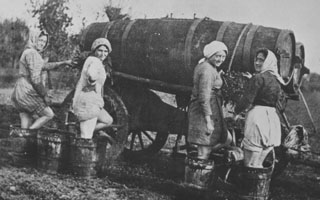Grape harvest and pressing

Grapes were harvested between mid-September and mid-October. The work was done on sunny days during the late morning, when the plants were completely dry of the morning dew. Picking involved the entire family, sometimes with the addition of day laborers. Equipment included billhooks, spring-loaded and common scissors, long ladders and panniers (panìr). From the panniers grapes were transferred into larger receptacles such as baskets (paniròn) or wooden troughs (navàz) for transport to the farmhouse cellar. The emptying of the containers was supervised by a person responsible for cleaning away the leaves, dried pieces and rotten or immature grapes in order to assure product quality.
Prior to the introduction of mechanized pressing machines (mustadòura a róll), grapes were trampled by foot inside wooden tubs (bigònz) or vats for this purpose (mustadòura).
This task was usually done by women. The resulting must was then divided between the landowner and tenant farmer. In many contracts of the 1800s, it was obligatory “to press the red grape for one’s own use and give an equal quantity of white grape” to the landowner. The must designated for sale was poured into long horizontal barrels arranged on wagons or carts -le castellate (castlè) or le mezze castellate (mèza) - for delivery. The must was brought to the cellar of the landowner or to customers in the city and countryside and portioned out with a pitcher. For every mezza castellata of must purchased, the buyer was gifted with an 8kg basket of grapes of the same quality.Until the early 1900s, specialized porters waited at the city gates for the barrels to be delivered from the countryside in the hope that they would be hired to unload the carts and transport the must to the cellars. In the early decades of the century, the adoption of cases led to the abandonment of this delivery method as well as the end of the practice of pressing the grapes in wooden tubs in the fields. Upon completion of the harvest, those without this product went to collect (andèr a sgaravlèr) the grape bunches (garavèl) left on the vines.